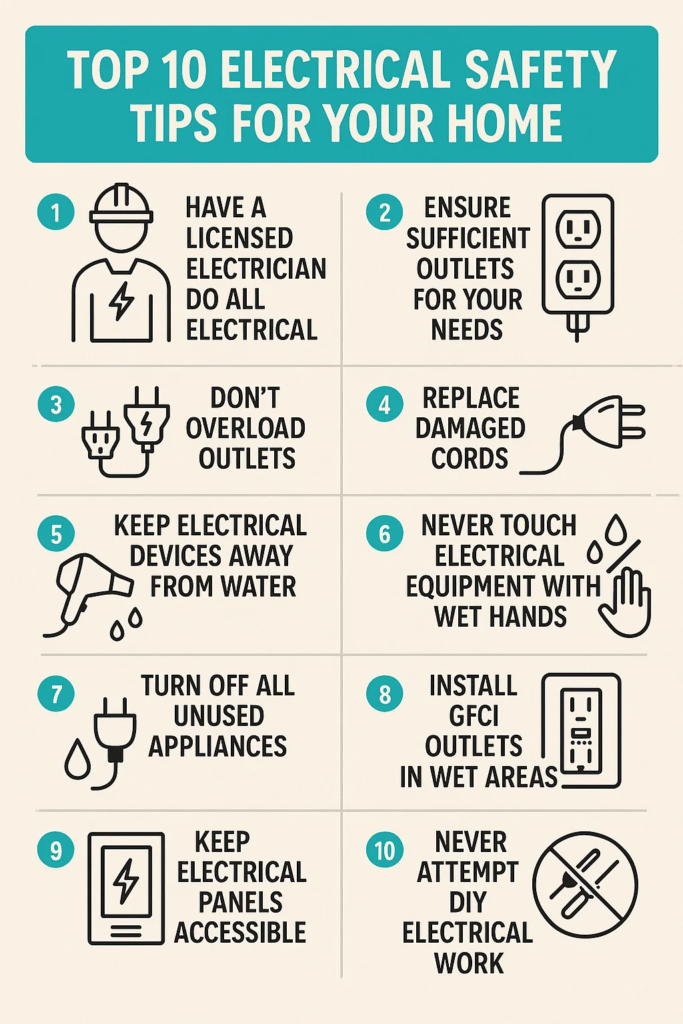Electricity is one of the greatest conveniences of modern life. From successively our lights and fans to running computers, refrigerators, and televisions, it’s hard to imagine daily life without it. But electricity, though unbelievably useful, comes with serious dangers if it’s not treated with care. Fires, electric shocks, battered appliances—even life-threatening injuries—can all result from ignoring electrical safety.
The good news? Most electrical accidents at home are completely preventable with some basic awareness and a few simple ways. Whether you live in a house or an room, these top 10 electrical safety tips will help you protect your family, your home, and your appreciated electronics.
- Avoid Overloading Electrical Outlets:
This one tops the tilt for a reason. Overloaded passages are one of the most shared causes of electrical fires at home. All outlet and circuit is designed to handle a careful amount of electrical load. Plugging in too many devices, especially high-power ones like heaters, irons, and microwave ovens, can aim the outlet to overheat—and possibly start a fire.
How to stay safe:
• Not ever plug too many devices into a single power strip or socket.
• Use surge protectors for electronics and smart power strips with constructed-in safety features.
• Avoid daisy-chaining several extension strings or power strips composed.
• If you constantly need more openings, get extra sockets installed by a licensed electrician instead of believing on multiple extension ropes.
Think of your opening like a road—it can only handle a convinced amount of traffic. Overloading it is like causing a traffic queue that ends in disaster. - Check Cords and Wires for Damage
Strings and wiring may seem harmless, but when damaged, they can be marking time bombs. Exposed, ragged, or undecided ropes increase the risk of electric shocks or incentives that could kindle a nearby object like a carpet or curtain.
Your action plan:
• Review cords every month for signs of wear—like cracks, unraveling, or staining.
• Replace damaged cords immediately. Don’t tape them or try to fix them yourself.
• Avoid running cords under carpets, mats, or furniture. These areas can trick heat and damage filling.
• Don’t cuddle cords in doors or windows or place heavy furniture on them.
Caring for cords is like checking the exhausts on a car—don’t wait until there’s a puncture to take action. - Install GFCIs in Water-Prone Areas
Water and electricity are a terminal combination. That’s where Ground Fault Circuit Interrupters (GFCIs) come in. These devices are designed to cut off power within milliseconds if they notice any imbalance in the electrical current—especially in rainy or damp areas.
Where you need GFCIs:
• Bathrooms
• Kitchens (particularly near sinks)
• Laundry rooms
• Basements
• Outdoor outlets and garden areas
Helpful habit: Test your GFCI outlets when a month by persistent the “test” button and then the “reset” button to protection they’re working. If your GFCI trips regularly, that’s a red flag—get it checked by a qualified electrician.
GFCIs are like lifesavers for your electrical system—they jump in to protect you when somewhat goes wrong. - Keep Devices Away from Water:
This strength sound obvious, but it’s worth repeating: Not ever use electrical devices near water. It only takings a few drops for water to cause a short circuit, damage your appliance, or worse—electrocute you.
Tips to prevent accidents:
• Always dry your hands before plugging in or using electrical items.
• Preserve devices such as hair dryers, shavers, phone chargers, and speakers away from sinks, bathtubs, or pools.
• Don’t leave appliances in dank places or on wet surfaces.
• If a device falls into water, unblock it directly—if it’s safe to do so—and don’t touch it until it’s completely dry.
Water may be good for a peaceful bath, but it’s not so great when it comes to electricity. - Turn Off and Unplug Appliances When Not in Use:
Leaving appliances plugged in might appear harmless, but ended time it increases the risk of overheating, sparks, and wasted energy. Electronics like phone chargers and microwaves motionless draw power when plugged in—this is often called “phantom power.”
Make it a habit to:
• Unplug small devices like toasters, blenders, and curling irons afterward use.
• Turn off switches when appliances aren’t needed.
• Usage smart plugs or timers for heavy-duty appliances like air conditioners or geysers.
• Not ever sleep or leave the house with devices like heaters or electric blankets running.
It’s a simple rule: If you’re not using it, switch it off and unblock it. Your wallet (and home) will thank you. - Educate Children about Electrical Safety:
Kids are naturally curious. But that curiosity can be dangerous when it comes to electricity. Young children might punch objects into openings or try to plug in items they don’t understand. That’s why educating them early is important.
What you can do:
• Use outlet care covers in rooms with young children.
• Show them what openings are for—and what not to do.
• Don’t let kids handle cords or plug in devices without supervision.
• Keep dangerous appliances, chargers, and cords out of their reach.
• Talk openly about why electricity can be dangerous—use stories or simple similarities they can relay to.
When you make safety part of your family’s everyday conversations, it becomes second nature to your kids. - Watch for Warning Signs in Your Electrical Panel:
Your home’s electrical panel—also known as a breaker box or fuse box—is like its heart. If something’s wrong there, it can cause all kinds of problems across the system. It’s important to check for early warning signs that strength indicate bigger issues.
Look out for:
• Frequent breaker trips
• Buzzing or humming noises from the panel
• A burning or smoky smell
• Flaming lights or devices that turn off randomly
If you sign any of these indications, don’t ignore them. Call a licensed electrician immediately. And if your home is older and still using out-of-date panels (like fuse boxes), consider an upgrade to meet modern safety standards.
Think of your electrical panel as your home’s control room—when it starts acting strange, don’t wait to investigate. - Don’t Attempt Complex DIY Electrical Work:
It might be attractive to fix a buzzing outlet or replace a light fixture on your personal, especially if you’re a handy person. But electricity isn’t something to jumble with unless you’re properly trained. One wrong move can reason serious injury—or even death.
When to call a professional:
• If you notification exposed wires or burning smells
• If an outlet spurs when you plug roughly in
• If switches texture warm to the touch
• If you want to install new outlets, lighting systems, or large appliances
DIY is great for decorating or building abandons—not so much for electrical work. When in doubt, call in the experts. - Use the Right Bulbs and Ensure Good Ventilation:
Using the wrong light bulb wattage can overheat fittings and increase fire risks. Similarly, electrical devices that are crowded into taut spaces with poor airflow can overheat.
Stay safe by:
• Checking the recommended bulb wattage on lamps and fixtures
• Keeping lamps away from curtains, papers, or other combustible objects
• Giving devices like computers, game consoles, and ovens enough space for air circulation
• Cleaning dirt from vents and fans regularly
Think of appliances like people—they need room to breathe too! - Schedule Regular Electrical Inspections:
Finally, perhaps the most active step you can take: Get your home’s electrical system professionally inspected every few years. This is specifically important if you live in an older home, if you’ve recently experienced power fluxes, or if you’re planning major restorations.
Benefits of regular inspections:
• Catch wiring issues before they become hazardous
• Confirm your system is properly grounded
• Upgrading out-of-date components
• Meet safety standards and building codes
An review might cost a little upfront, but it can save lives—and a lot of money—in the long run.

Conclusion
Electrical care is all about prevention and smart habits. By continuing focused and practicing these tips reliably, you help defend your home, your family, and yourself from avoidable dangers. A harmless home is a happy home—keep the stimuluses only where they belong!
